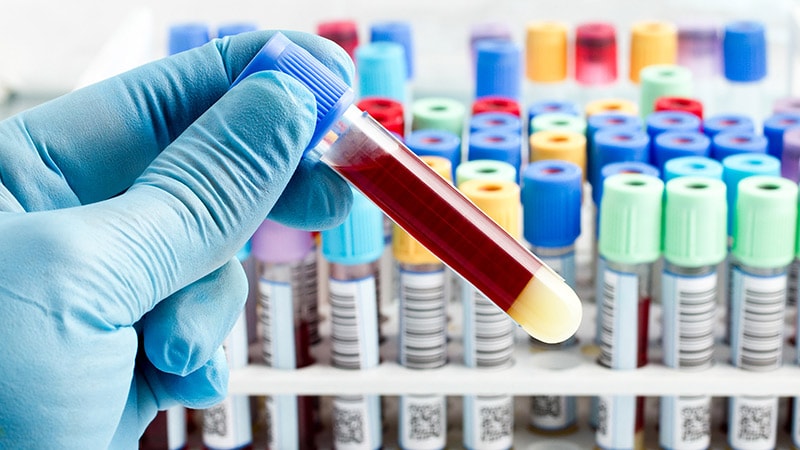Blood Test Identifies Bipolar Disorder Misdiagnosis
Основные понятия
Blood test biomarkers accurately identify bipolar disorder misdiagnoses.
Аннотация
The study focused on a blood test's ability to identify patients with bipolar disorder who were previously misdiagnosed with major depressive disorder. The methodology involved analyzing biomarkers in participants who had been diagnosed with MDD but actually had BD. The study used a panel of 17 biomarkers to correctly identify patients with BD, showing promising results for improved diagnosis accuracy.
TOPLINE:
Blood test identifies bipolar disorder in patients misdiagnosed with major depressive disorder.
Test can identify up to 30% of patients with BD.
Combining the test with a psychometric assessment enhances effectiveness.
METHODOLOGY:
Study aimed to identify biomarkers for accurate BD diagnosis.
Participants completed questionnaires and provided blood samples for analysis.
Biomarkers correlated with manic symptoms and validated in a separate group.
TAKEAWAY:
Panel of 17 biomarkers correctly identified BD in previously misdiagnosed patients.
Biomarkers correlated with lifetime manic symptoms.
Combining biomarkers with patient-reported data improved diagnostic models.
IN PRACTICE:
Biomarkers add value in scenarios with unavailable psychiatric symptom data.
Particularly beneficial for patients with uncertain diagnoses.
SOURCE:
Study led by Jakub Tomasik, PhD, published in JAMA Psychiatry.
Study funded by Stanley Medical Research Institute and Psyomics.
LIMITATIONS:
Missing data on confounding factors like diet and blood pressure.
Sample mostly comprised White internet users, not fully representative.
DISCLOSURES:
Tomasik has a patent pending for DBS blood biomarkers.
Other disclosures noted in the original article.
A Blood Test to Diagnose Bipolar Disorder?
Статистика
The identified biomarker panel provided a mean cross-validated area under the receiver operating characteristic curve of 0.71 (P < .001).
Combining biomarker readouts with patient-reported data significantly improved the performance of diagnostic models (P = .03 for all).
Цитаты
"The added value of biomarkers was particularly evident in scenarios where data on psychiatric symptoms were unavailable and at intermediate diagnostic thresholds, suggesting that biomarker tests may especially benefit patients who do not report their symptoms and whose diagnoses are uncertain." - Authors
Ключевые выводы из
by Eve Bender в www.medscape.com 10-26-2023
https://www.medscape.com/viewarticle/997789
Дополнительные вопросы
How can the incorporation of biomarkers in diagnostic testing impact the overall accuracy of mental health diagnoses?
The incorporation of biomarkers in diagnostic testing can significantly enhance the accuracy of mental health diagnoses by providing objective and measurable indicators of specific conditions. In the context of bipolar disorder (BD) and major depressive disorder (MDD), where symptoms can overlap, biomarkers offer a more precise way to differentiate between the two conditions. By analyzing biomarkers associated with manic symptoms, as demonstrated in the study, clinicians can more effectively identify patients with BD who were previously misdiagnosed with MDD. This not only reduces the likelihood of misdiagnosis but also enables tailored treatment plans based on the specific condition identified through biomarker analysis. Overall, the use of biomarkers in diagnostic testing can lead to more accurate and personalized mental health care.
What potential biases could arise from the study's sample composition of mostly White internet users?
The study's sample composition predominantly consisting of White internet users introduces several potential biases that may impact the generalizability of the findings. Firstly, the lack of diversity in the sample limits the applicability of the results to a broader population, as different ethnic groups may exhibit variations in biomarker profiles related to mental health conditions. Additionally, the reliance on internet users may introduce selection bias, as individuals who have access to and are comfortable using online platforms may differ in various ways from those who do not. This could skew the results towards a specific demographic, potentially overlooking important differences in biomarker patterns among diverse populations. To address these biases, future studies should aim for more diverse and representative samples to ensure the validity and applicability of biomarker-based diagnostic tests across different demographic groups.
How might the development of biomarker tests for mental health conditions influence the future of personalized medicine?
The development of biomarker tests for mental health conditions holds great promise for the future of personalized medicine by enabling more precise and individualized approaches to diagnosis and treatment. By identifying specific biomarkers associated with different mental health disorders, clinicians can tailor interventions based on the unique biological characteristics of each patient. This shift towards personalized medicine allows for targeted therapies that are more effective and have fewer side effects compared to traditional one-size-fits-all treatments. Moreover, biomarker tests can aid in early detection, monitoring treatment response, and predicting outcomes, leading to improved patient outcomes and quality of care. As research in this area advances, biomarker-based diagnostic tools are likely to play a crucial role in revolutionizing mental health care, offering a more personalized and effective approach to managing psychiatric conditions.
0
